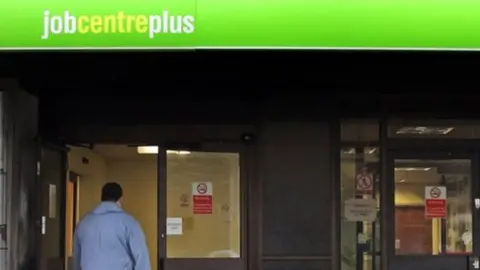Coronavirus: Nearly a million universal credit claims in past two weeks
 Getty Images
Getty ImagesNearly a million people have applied for universal credit benefits in the past fortnight as the coronavirus pandemic has worsened.
The Department for Work and Pensions said 950,000 successful applications for the payment were made between 16 March, when people were advised to work from home, and the end of the month.
The department would normally expect 100,000 claims in a two week period.
Officials said they were working "flat out" to help people get support.
But Labour said the figures were "truly shocking" and the government "must wake up and take action" to help the millions of those at risk of losing their jobs and the self-employed not covered by government hardship schemes.
The figures show the massive increase in demand on the benefit system since the government urged people to avoid non-essential travel and contact with others to curb the spread of the virus.
There was a warning on Wednesday that 20% of small businesses could fold in the next month due to the collapse in consumer demand, despite unprecedented government intervention to support jobs.
'Pressure on services'
Universal credit is a consolidated monthly payment for those of working-age, which replaced a host of previous benefits including income-based jobseeker's allowance, housing benefit, child tax credit and working tax credit.
In October 2019, there were 2.6 million universal credit claimants - just over a third of whom were in work.
The government said the benefit system was still "delivering" despite the massive increase in demand.
"With such a huge increase in claims there are pressures on our services, but the system is standing up well to these and our dedicated staff are working flat out to get people the support they need," a spokesperson said.
"We're taking urgent action to boost capacity - we've moved 10,000 existing staff to the help on the front line and we're recruiting more."


The sudden and vast increase in those signing up is powerful evidence that the coronavirus crisis is an economic emergency for a very significant portion of the public, losing work and losing income in ways they could never have anticipated a few short weeks ago.
The numbers of people losing out on work could therefore be higher even than this significant level. But given the numbers who have managed to register, there are obviously very significant efforts going on at the DWP to expand the service to try to meet the scale of the need.
The government has already stepped in with support for the economy and for workers in ways that have no modern parallel.
In time, there may be questions about whether the country can really afford to support new legions of workers through hard times for more than a short emergency period.
But right now, these figures provide urgent evidence that only a fortnight after the country was told to shut up shop, there are many, many thousands, already in economic need.

Since the virus struck, the government has made a series of changes designed to make it easier for the self-employed to claim the benefit and to ensure they will not lose out as their earnings dry up.
Labour has urged ministers to go much further, saying the verification process for new claimants should be speeded up and upfront cash advances - available for those in urgent need - should not have to be repaid.
"People need help now," said shadow work and pensions secretary Margaret Greenwood.
"The government should turn advances into non-repayable grants to end the five week wait and make sure people get the support they need quickly at a level that genuinely protects them from poverty."

Have you lost your job or been furloughed due to the coronavirus? Share your experiences by emailing [email protected].
Please include a contact number if you are willing to speak to a BBC journalist. You can also contact us in the following ways:
- WhatsApp: +44 7756 165803
- Tweet: @BBC_HaveYourSay
- Please read our terms & conditions and privacy policy
